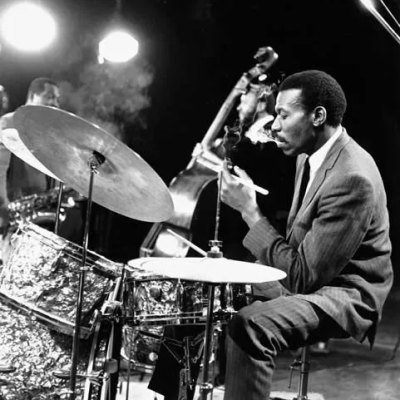.
.
photo by Lee Tanner

.
.
Elvin Jones at the WGBH-TV studio in Boston, 1966
………………based on a photo by Lee Tanner
He seems to be……………….. sweating from …………outside
in. ………………..As if all the ills of the world
flow into him, ………….then flood back out
through his sticks and skins. How can anyone possibly look
so cool in the heat ………of drumming? A menthol
constantly dangling from his mouth ……………..while he plays.
Cigarette between left index finger ………………..and middle
in the gaps ………between …………songs. Smoke
he exhales hovers …….a ghost, …………………………….always
about to consume him. Somehow ……………..it doesn’t. Elvin Jones
perched on his drum-seat…… throne……………….. in pinstriped
suit and cufflinks ………..1950s-cool, telling us how it all sounds
deep inside. Heart ………………..shuffling blood back ………………….and
forth …………….through body cells, replicating the sound
of our mother’s womb ………..when by chance we came back
into a body again …………………to finally make things
…………………………………right.
You make things right, Elvin. Even when …..we switch
points of view. Moving ………………………………..third person
to second. Like you and…….. your two brothers—
Hank and Thad— ………………………….leaving the aching
assembly lines ……………of Pontiac, Michigan,
………………………….for further adventures
in the jazz clubs of New York…………………… Or considering
Chicago. Standing, say, ……………………….at Starved Rock
above the Illinois River, looking out ……………..upon the human
capacity to kill. The Blackhawk Wars …………….are still pouring through
Chicago’s South Side …………….where I was born, as if trapped
in the duality of a checkerboard ……………………of indigenous
and “owned.” …………..Everybody wants to be kinged
or just get to the other side. …………………………..Without hurt-
holds. Without ……………scars.
…………………………………………..Where winning and losing both
bring regret. You absorb it all, …………………Elvin—even the riots
and burned buildings of Detroit, ………..color lines
outside the studio in Boston—………………………… letting it out
through your pores ………………into Miles, Mingus, and Trane,
holding up the beat ……………………………that helped make them
great. Something, …………yes, ………………………..is always about
……………………………………………….to consume you
in this photo or that. Some ……………………………..ghost-hold.
Your eyes almost always ………………………………………………..caught
half shut, …………cigarette in mouth, ………curls from a Salem
or a Kool …………………………stinging them, sending out smoke
signals ……….of hope. ………………………………..As if you’re listening
…………………………………to some salve inside
yourself, Elvin. ……………………………………………….Inside us all.
As you lay out …………………………….rhythms old and new
that—even with unfamiliarity—still seem ……..to us inwardly
known. ………….Giving us back …………………………..the terrible beating
our own terrible hearts— ………………………over and again—take
into and ………..upon themselves. And,……………………………. in taking,
……………………………………………………………………………make.
.
.
___
.
.
photo by Jim Whitcraft

George Kalamaras is former Poet Laureate of Indiana (2014– 2016) and Professor Emeritus at Purdue University Fort Wayne, where he taught for thirty-two years. He has published twenty-three collections of poetry, fourteen full-length books and nine chapbooks. His latest book is To Sleep in the Horse’s Belly: My Greek Poets and the Aegean Inside Me, a 300-page chronicle of George’s Greek ancestry—literary, artistic, and familial (Dos Madres Press, 2023).
.
.
Listen to Elvin Jones playing drums on the 1961 recording “Softly, As In a Morning Sunrise,” from Coltrane Live at the Village Vanguard, with John Coltrane (soprano saxophone); McCoy Tyner (piano); and Reggie Workman (bass). [Universal Music Group]
.
.
___
.
.
Click here to read The Sunday Poem
Click here for information about how to submit your poetry or short fiction
Click here to subscribe to the (free) Jazz Musician quarterly newsletter
Click here to help support the ongoing publication of Jerry Jazz Musician, and to keep it commercial and ad-free (thank you!)
.
.
.
___
.
Jerry Jazz Musician…human produced (and AI-free) since 1999
.
.
.





























